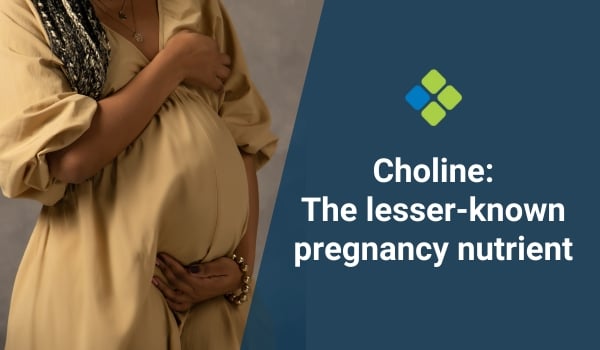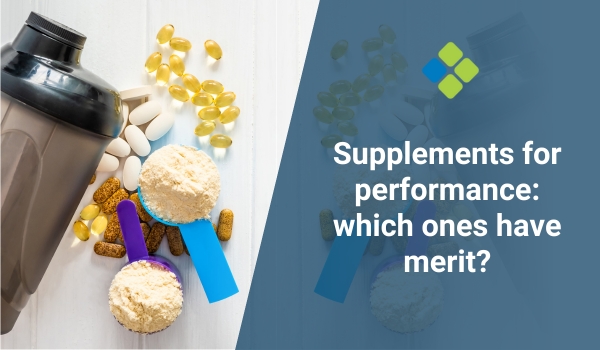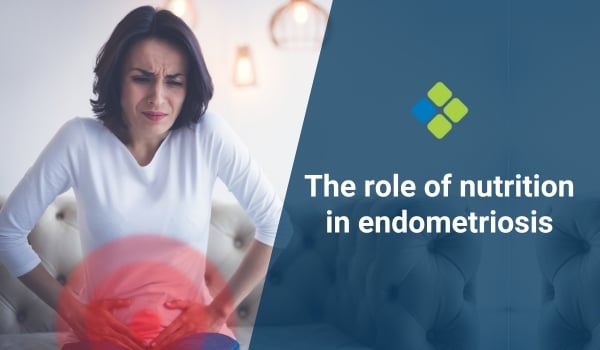Choline: The lesser-known pregnancy nutrient
Learn more about the importance of choline to support women who are trying to conceive or who are pregnant, via medical nutrition therapy.

HealthCert Education
When you think of nutrients that are important during the preconception period, folic acid likely comes to mind. However, growing research has highlighted a lesser-known nutrient that seems to be equally important during this period and throughout pregnancy. This nutrient is choline.
Learn more about nutrition during pregnancy in the HealthCert Professional Diploma program in Medical Nutrition Management – online nutrition training for GPs.
Choline is a vitamin-like nutrient (it’s not actually a vitamin or mineral) and is needed for many body processes, including transportation of fat, liver function, metabolism, creating genes, and nervous system function [1].
While the importance of choline has long been known, it’s critical role during pregnancy has only recently come into the spotlight. It appears to be just as important as folic acid for preventing neural tube defects and for the development of the fetal brain and nervous system [2].
Studies have found that an increased maternal intake of choline during pregnancy may improve the baby’s cognitive function. A 2023 narrative review found that choline supplementation may enhance foetal brain development and improve signs which may predispose the foetus to mental illness [3].
A randomised control trial also found that when women consumed twice the recommended amount of choline in the last trimester, it improved infant information processing speed, and that even small increases in choline intake may improve infant cognitive outcomes [4].
Choline also plays a role in regulating hormones and may be important for fertility. Research indicates that increasing choline may increase ovarian function and increase antral follicles, potentially helping women who are trying to conceive [5].
Despite its critical role, it’s estimated that only 1% of Australian women of reproductive age meet the adequate intake of choline [6]. On top of that, most pregnancy supplements do not contain choline. While the adequate intake for choline for women over 19 is 425mg daily, choline needs increase during pregnancy and breastfeeding, to 440mg and 550mg daily, respectively [7].
Some excellent sources of choline that can help women meet their requirements include eggs (2 eggs provide 50% of choline needs!), salmon, poultry, beef, milk, soybeans, and mushrooms. Some women may benefit from taking a choline supplement, such as those who follow a vegetarian or vegan diet.
It’s important that women have a well-planned diet during the preconception period as well as during pregnancy to ensure nutritional needs are met. Raising awareness around the importance of choline can help women best support their growing baby. GPs are well placed to provide guidance on choline intake to women who are trying to conceive or who are pregnant.
Learn more with the online HealthCert Professional Diploma program in Medical Nutrition Management.
– Sarah Marko, Accredited Practising Dietitian
Read another blog: Medical nutrition therapy for menopause
References
[1] López-Sobaler, A. M., Lorenzo Mora, A. M., Salas González, M.ªD., Peral Suárez, Á., Aparicio, A., & Ortega, R. M.ª (2021). Importancia de la colina en la función cognitiva [Importance of choline in cognitive function]. Nutricion hospitalaria, 37(Spec No2), 18–23. https://doi.org/10.20960/nh.03351
[2] Shaw, G. M., Finnell, R. H., Blom, H. J., Carmichael, S. L., Vollset, S. E., Yang, W., & Ueland, P. M. (2009). Choline and risk of neural tube defects in a folate-fortified population. Epidemiology (Cambridge, Mass.), 20(5), 714–719. https://doi.org/10.1097/EDE.0b013e3181ac9fe7
[3] Spoelstra, S. K., Eijsink, J. J. H., Hoenders, H. J. R., & Knegtering, H. (2023). Maternal choline supplementation during pregnancy to promote mental health in offspring. Early intervention in psychiatry, 17(7), 643–651. https://doi.org/10.1111/eip.13426
[4] Caudill, M. A., Strupp, B. J., Muscalu, L., Nevins, J. E. H., & Canfield, R. L. (2018). Maternal choline supplementation during the third trimester of pregnancy improves infant information processing speed: a randomized, double-blind, controlled feeding study. FASEB journal : official publication of the Federation of American Societies for Experimental Biology, 32(4), 2172–2180. https://doi.org/10.1096/fj.201700692RR
[5] Zhan, X., Fletcher, L., Dingle, S., Baracuhy, E., Wang, B., Huber, L. A., & Li, J. (2021). Choline supplementation influences ovarian follicular development. Frontiers in bioscience (Landmark edition), 26(12), 1525–1536. https://doi.org/10.52586/5046
[6] Probst, Y., Guan, V., & Neale, E. (2019). Development of a Choline Database to Estimate Australian Population Intakes. Nutrients, 11(4), 913. https://doi.org/10.3390/nu11040913
[7] NHMRC Australia. Nutrient Reference Values for Australia and New Zealand Including Recommended Dietary Intakes | National Health and Medical Research Council. 2006.

 1800 867 1390
1800 867 1390





